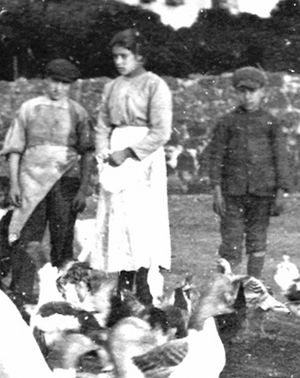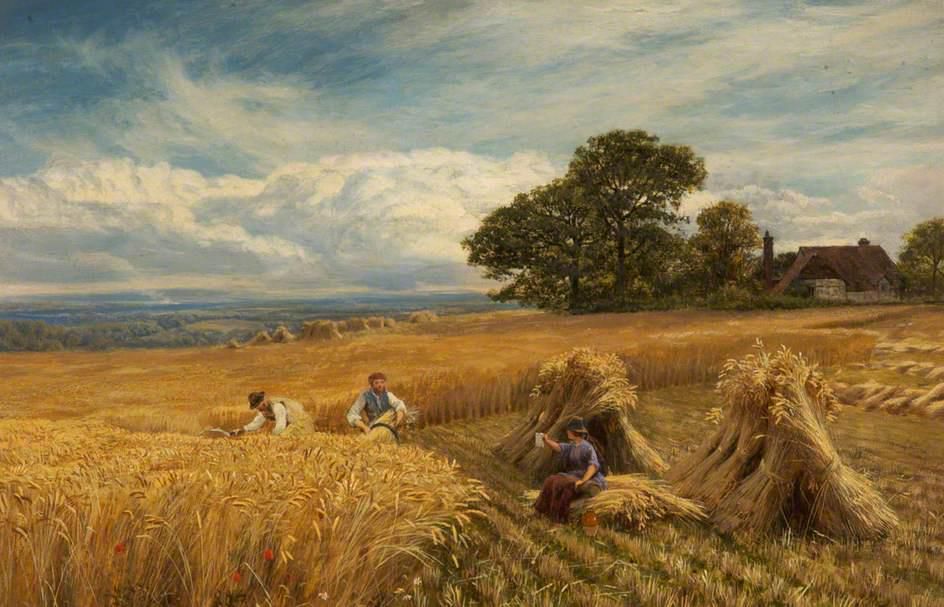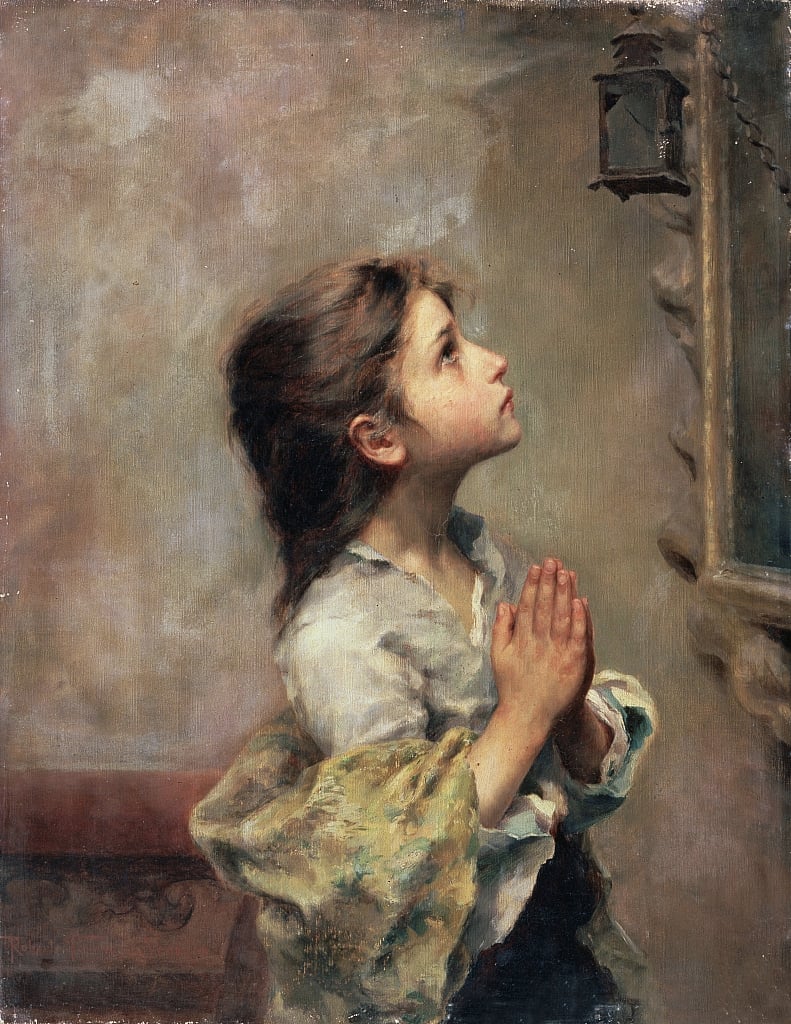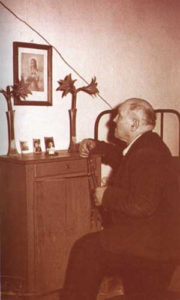A White Martyrdom Turned Red – Part 1
 On July 6, 1902, in a small rural Italian town, a young girl of twelve named Maria was forcibly propositioned by a twenty-year old family acquaintance named Alessandro. In her valiant resistance, Maria was stabbed several times, later to die from her injuries. Almost fifty years later, little Maria would be canonized by Pope Pius XII as a martyr of purity at what was then the largest crowd ever for a canonization.
On July 6, 1902, in a small rural Italian town, a young girl of twelve named Maria was forcibly propositioned by a twenty-year old family acquaintance named Alessandro. In her valiant resistance, Maria was stabbed several times, later to die from her injuries. Almost fifty years later, little Maria would be canonized by Pope Pius XII as a martyr of purity at what was then the largest crowd ever for a canonization.
The account of St. Maria Goretti is hardly a fairy tale, and it is a fascinating fact that Maria’s elderly mother, Assunta, was present at her daughter’s canonization, along with her attacker, who by then was nearly seventy years old. We can only wonder the emotions of a mother under such circumstances – perhaps a combination of extremes – a good measure of euphoria intermixed with profound sorrow as she recalled the events surrounding her daughter’s death.
In 1897, when Maria was only six, her father Luigi, an exceptionally hard-working and devout Italian peasant farmer, relocated his family of (then) four children to a small village south of Rome, with the hope of finding more suitable work to better provide for his family. The Goretti’s never knew anything more than abject poverty. Life was hard and uncertain, but despite that they were a happy family grounded firmly in the holy Faith; prayer and Mass were quite regular, and Maria demonstrated a maturity of a devout life from an early age. She could be playful and sweet, but was generally of more serious demeanor, and was not one complain much; she took her Faith and prayers to heart. The family made the two-hundred-mile journey over mountains in the summer heat in just two weeks, and Luigi was able to secure work for a landowner, draining marshes and turning them into farmland. In return, they were given a place to live and a profit-share of the crops. Assunta quickly began transforming the run-down house into a home; the children helped out in whatever way they could.
Within a few months, Luigi remarkably managed to drain eight acres of land and plant the new fields with wheat and barley. The backbreaking work wore him down physically, and there was constant threat of malaria in that region. He ignored the symptoms and continued to keep up his pace; but although God forgives, nature does not, and it all eventually caught up with him. Becoming too ill to work right at harvest time, the Goretti’s landlord hired Giovanni Serenelli and his youngest son, Alessandro, to finish the work. Giovanni was more than willing to work with Luigi but would be entitled to half the profit and enjoy a communal life with the Goretti’s. There was no choice in the matter, but in spite of disappointment at the prospect, things worked out well at the start. Luigi recovered sufficiently and the two men worked well together; the Goretti children just loved Alessandro.

But Giovanni had his own unresolved baggage: his wife had died some years earlier in an asylum, one of his other sons was an inmate there, and the rest of his children had gone the way of the world; only Alessandroremained. As time went on with the Goretti’s, Giovanni took to the bottle, and became increasingly more irritable and overbearing, causing much stress for Luigi. He did not complain much, but as the next few years passed, the toll it took on him was evident, more because of the burden it placed on his family than anything else.
As mentioned, Maria’s faith and piety was well beyond her years; her personal purity and modesty lended a certain presence to her. She had become so used to sacrifice that she actually got the town baker angry at her once when she put a cookie he gave her to enjoy in a bag to give to one of her siblings; seeing how he was offended, she took it out and ate it in front of him. During this same time interval, Alessandro developed his own problems. The years of maternal neglect coupled with bad companions during his youth made him vile, hostile, and sullen. He began to shun the Goretti children and soon began spending most of his times locked up in his room brooding over trashy magazines. Maria quickly grew sensitive to his change in demeanor; her mother even found the trash when cleaning his room, and although concerned about Alessandro’s influence on her oldest son, took no action in order not to bring further trouble into the home. This continued for four years.
By April 1902, fatigue and malaria would claim Luigi’s life. Giovanni became the master of the farm, and by this time he was a harsh and ruthless man. The Goretti’s were permitted to stay and work for him. Left with no choice but to stay, Assunta, who had seven children now, was then forced to work in the field with the boys, leaving Maria, now twelve, with all the housework. For Maria, her father’s long illness and death, Giovanni’s cruelty, and the never-ending work made her quite serious for her age, so much so that the village children referred to her as the “little old lady.” Her mother noticed it, too, but could only do so much to give her daughter relief.
 Nonetheless, Maria found needed solace with God, and would spend large amounts of time in prayer at night. She concealed her tears in her prayers, and her devotion to Christ’s Passion and her obedience to her mother were extraordinary. Interestingly enough, in his later years, Alessandro recalled how Maria’s piety always impressed him, remarking that when she prayed, she really looked like she meant what she said. But for the time at hand, Maria felt much threatened by Alessandro; he had been stalking her for a while with evil intent, and she lived in fear of him. However, she kept this to herself, fearful of repercussions from Giovanni and not wishing to add to her mother’s worry.
Nonetheless, Maria found needed solace with God, and would spend large amounts of time in prayer at night. She concealed her tears in her prayers, and her devotion to Christ’s Passion and her obedience to her mother were extraordinary. Interestingly enough, in his later years, Alessandro recalled how Maria’s piety always impressed him, remarking that when she prayed, she really looked like she meant what she said. But for the time at hand, Maria felt much threatened by Alessandro; he had been stalking her for a while with evil intent, and she lived in fear of him. However, she kept this to herself, fearful of repercussions from Giovanni and not wishing to add to her mother’s worry.
On July 6, the day before her first Communion, while alone at the house with her baby sister, Maria was attacked at knifepoint by Alessandro. All the while during the attack, Maria’s concern above her own integrity was the soul of Alessandro, screaming at him that it was a sin, that God forbade it, and he would go to hell for it. He stabbed her in anger and fled. Maria lived for twenty more hours. The local priest came to administer the last rites; before giving her First Communion, he reminded her of Christ’s pardon of those who crucified him, and without the least anger or resentment, said that she pardoned her murderer. Alessandro was quickly apprehended, tried, and sentenced to thirty years solitary confinement.

He was angry and uncooperative for the first eight of those years, until the night he had a dream where he attests that he saw Maria gathering lilies; as she handed them to him, he became aware of a tremendous peace that could only come with forgiveness.
He repented sincerely and was a model prisoner for the rest of his sentence. Assunta forgave him as well with the same heartfelt sincerity, and he spent the rest of his life in penance working at local monasteries. He would die in May 1969.
July 8, 2021








